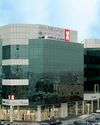
As the Omicron wave of the pandemic swept across America this winter, makers of at-home Covid tests faced a unique business dilemma. Seemingly overnight, demand for their products became infinite. Massive government contracts were up for grabs. By mid-January, the Biden Administration had promised to buy 1 billion of the tests. But it was almost equally certain that demand for the tests would vanish— at least temporarily—by the time spring arrived.
Sunnyvale, California-based iHealth Labs, which only received FDA authorization for its test in November, churned out more than 500 million Covid-19 home test kits for the U.S. market in February an astronomical increase over the 20 million to 30 million it produced in December. “We cranked up very quickly,” says iHealth chief operating officer Jack Feng. “It was almost like a battle.”
It was a whole new line of business for iHealth, which is majority-owned by China’s publicly traded Andon Health and made stuff like blood-pressure monitors and thermometers before the pandemic. Its contract manufacturer in Tianjin, China, also owned by Andon, made kits round-the-clock and even stayed open with partial staff on Chinese New Year’s. To help get the tests to the States, iHealth chartered 100 airplanes. Some 350 million of its antigen tests went to fulfill its government contracts, which are worth more than $1.3 billion, with the rest going to drugstores and other retailers.
This story is from the April 2022 edition of Forbes Middle East - English.
Start your 7-day Magzter GOLD free trial to access thousands of curated premium stories, and 9,000+ magazines and newspapers.
Already a subscriber ? Sign In
This story is from the April 2022 edition of Forbes Middle East - English.
Start your 7-day Magzter GOLD free trial to access thousands of curated premium stories, and 9,000+ magazines and newspapers.
Already a subscriber? Sign In

Celebrating Emirati Businesswomen and Entrepreneurs on Emirati Women's Day
As part of the U.A.E.’s annual Emirati Women’s Day celebrations, the Abu Dhabi Business Women Council and the Abu Dhabi Chamber hosted an event on August 28, 2024, under the theme “We Collaborate for Tomorrow,” celebrating the role and achievements of Emirati women.

THE MIDDLE EAST'S TOP 100 HEALTHCARE LEADERS 2024
MENA’s healthcare landscape is evolving towards integration, marked by the rise of fully comprehensive ecosystems. Industry giants are setting future trends, driven by systems that thrive on data abundance, accessibility, and intersectoral collaboration.

SCOUTING FOR OPPORTUNITIES
Ayman Cheikh-Lahlou, Chairman and CEO of the Morocco-based Cooper Pharma, took the helm of the family-owned pharmaceutical company in 2005 and has seen business boom over nearly 20 years. Now, he’s exploring expansion opportunities in new markets.

TURNING THE TIDE
Irina Zaporozhets, President and General Manager for Eli Lilly Suisse S.A. in the META region is driving expansion, focusing on innovation and patient-centric care. As she navigates regional challenges, her commitment to expanding access to medicine remains at the forefront.

Supercharging AI
Armed with a newly raised 640 million, GROQ thinks it can challenge one of the world’s most valuable companies with a purpose-built chip designed for Al from scratch.

How Technology is Accelerating Digital Equality in Diverse Markets
The rise of smartphones and digital technologies has transformed our daily lives, contributing to the evolution of connected consumers.

Rare Fortune
Money manager JAMES LITINSKY turned a bad junk bond bet into a $400 million fortune. His MP Materials operates a strategic mine and will begin manufacturing supermagnets for electric vehicles next year.

The State of Mental Health in the Middle East
While mental health awareness is on the rise, the Middle East faces some challenges in providing care. Still, we're seeing some progress.

Big Breakthroughs
From gene therapy to nasal sprays, these were some of the most significant healthcare breakthroughs in the last year.

MENA's 5 Most Valuable Healthcare Companies 2024
The combined market cap of 57 healthcare companies listed on MENA's stock exchanges hit $83.7 billion on August 13, 2024, with the top five companies accounting for about 62.4% of the total market cap. These are MENA's five most valuable healthcare companies in 2024.